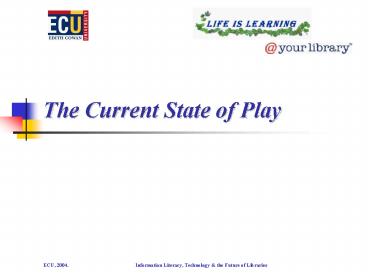The Current State of Play - PowerPoint PPT Presentation
1 / 19
Title:
The Current State of Play
Description:
How to use a computer, access the file structure, save ... solve problems and steer students through uncertain and complex futures. ( Jamie McKenzie, 2000) ... – PowerPoint PPT presentation
Number of Views:26
Avg rating:3.0/5.0
Title: The Current State of Play
1
The Current State of Play
2
Terminology
- These terms are used interchangeably, but they do
not mean the same thing. - Computer literacy
- ICT literacy
- Information literacy
3
Computer literacy
- How to use a computer, access the file structure,
save information, use a range of software
products such as wordprocessing, spreadsheets,
databases and other publishing packages
(graphics, animation).
4
ICT literacy
- How to use Information Communications
Technologies (ICTs) including email, the Internet
(browsers, search engines, uploading and
downloading), the World Wide Web (WWW not the
same as the Internet), IRC (Internet Relay Chat).
5
Information literacy
- A developmental skills set that enables
individuals to be lifelong learners and to
participate successfully in a complex,
information-rich world, ie. they have the ability
to locate and use information to meet their
needs.
6
Information literacy
- Inquiry skills using a range of resources,
tools technologies - Literacy skills language literacy (oral,
audio written), digital
literacy, electronic literacy, computer literacy,
e-literacies, media literacy, ICT literacy,
visual literacy, critical literacy, ethical
literacy, moral literacy, information
problem-solving literacy, numerical literacy,
cultural literacy, social literacy, political
literacy, multicultural literacy, . (Lepani,
1998)
7
Information literacy
- Collate, evaluate, analyse, deconstruct
information using a range of resources, tools,
technologies - Skimming/scanning, note making, presenting
information using a variety of formats, using a
range of tools technologies - Reconstruct understandings and substantiate
your argument - Learning to work collaboratively in a team,
roles
8
Information literacy
- Time management, meeting deadlines, creating
schedules - Information management using a range of
resources (text, pictorial, oral, human,
multimedia, online, electronic), tools (email,
file structures, indexes, contents)
technologies.
9
Information literacy
- These terms are often used synonymously eg. ECUs
graduate attributes, Connected Learning
Conference. - Information literacy is the overarching term.
- An information literate person builds on the
skills set and is a lifelong learner.
10
Research
- School Library Impact Studies
- http//www.lrs.org/impact.asp
- Ross Todd, Rutgers University, New Jersey
- http//www.scils.rutgers.edu/rtodd/
- Impact of School Libraries on Student
Achievement a Review of the Research - http//www.asla.org.au/research/index.htm
11
Research
- Aesop to e-book the story goes on
IASLConference, 2004. - Five Year study in the UK tertiary students and
their use of electronic information resources
(EIR). (Lonsdale, R. and Armstrong, C.) - Findings students significantly under-used EIR.
Many students did not know how to use EIR
effectively or efficiently. - Proposal - investigation of three additional
areas the role of the teacher librarian and
support staff in supporting skills development,
initial teacher training and e-resource provision
across sectors.
12
Commonwealth Govt
- Commonwealth Government uses the terms
information literacy skills development and ICT
literacy skills interchangeably. - In the national policy documents the development
of these skills is the responsibility of schools
and public libraries. (DCITA. (2002)
13
eGovernance
- In 2000 a directive was sent to all public
service agencies to provide information about
services provision online. - Early in 2004, we saw the tip of the iceberg
when the WA Government announced that now all
information about Government jobs would now only
be available online. - What does this mean for public libraries and
changing service provision?
14
National Testing
- Australian Computers in Education Conference,
Adelaide, 2004. - Presenters at a panel discussion and a paper
session announce national testing for ICT
literacy skills for all year six and year ten
students across Australia. - The proposed timeline included trials by April
2005, with final testing ready for January 2006.
15
National Testing
- ICT literacy definition
- Domain 1 ICT literacy specifically, being able
to use the WWW and email. - Domain 2 Information literacy Concerns were
expressed that TLs and schools were trying to
embed the development of these skills into
curriculum and for technology to be seen as a
tool, whereas this testing model differentiates
use of technology as a specific skill that should
be taught in isolation. - Domain 3 Ethics and appropriate use
16
Education
- Outcomes Based Education
- Post Compulsory Education Review
- Learning Technologies
- Le_at_rning Federation
17
The Future
- Despite the large amount of capital spent in this
global PC rush there is little evidence that
student performance has improved or brought about
any real lasting change in the way teachers
teach. - Information Technology (IT) will not transform
schools, rather it is great teaching combined
with information literacy and questioning skills
which may bring about the desired outcomes for
students. (Jamie McKenzie, 2000)
18
The Future
- Information Literacy (IL) is mainly about
developing understanding and insight, it is about
interpretation of information to guide decisions,
solve problems and steer students through
uncertain and complex futures. (Jamie McKenzie,
2000) - IL is not location skills or library skills
taught in isolation.
19
The Future
- Role of libraries, TLs and Librarians?
- Plan and implement programs that embed the
development of IL skills so students and
community members can become self-sufficient
users of information. - Take a leadership role in the development of
information skills within educational/user
programs.































